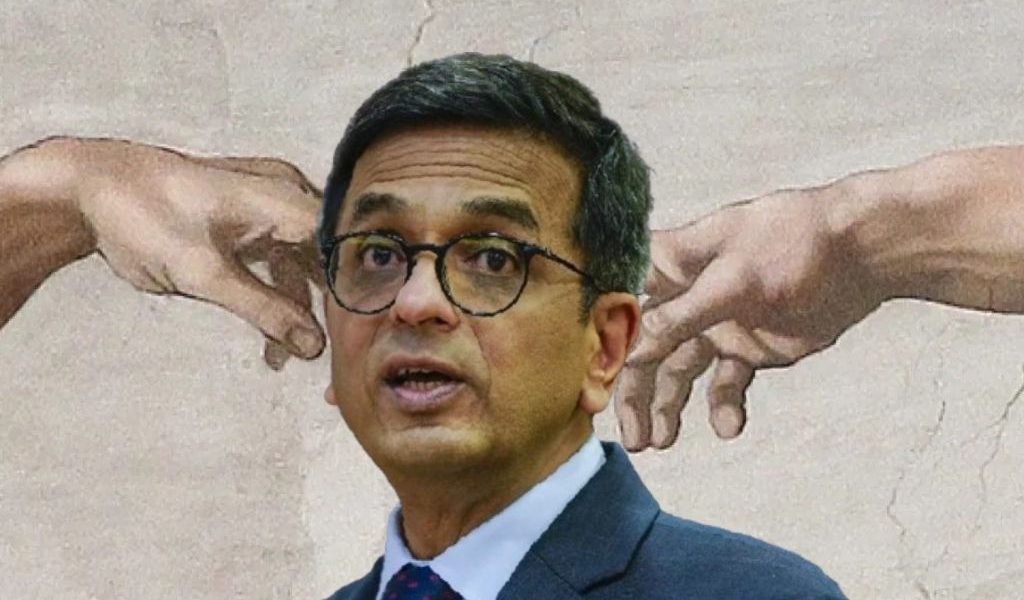– Siddharth Varadarajan
Credit: The Wire
Hindutva politicians who are thrilled with the CJI’s candour would be the first to yell ‘bias!’ if – in a bitter dispute between a Muslim and a Hindu litigant – a Muslim judge who delivers a verdict that favours the Muslim says the ‘solution’ came to him from Allah!
“Very often we have cases (to adjudicate) but we don’t arrive at a solution,” he said. “Something similar happened during the Ayodhya (Ram Janmabhoomi-Babri Masjid) dispute which was in front of me for three months. I sat before the deity and told him he needed to find a solution,” he added.
India’s top judge has provided such a vivid and moving description that we can picture “the solution” being delivered in an epiphanous flash. And going by the judgment which Justice Chandrachud and his colleagues eventually delivered, the deity appears to have said: give me the land so that I can have another temple.
The deity having spoken, the only job left for the judges was to dress up this “solution” with the cloth of judicial reasoning to the best of their ability. His temple secured, the deity then honoured the faith that each of the five judges had shown in his divine judgment. The man who was CJI at the time, Ranjan Gogoi, was sent by God to the Rajya Sabha. Two of the puisne judges on the bench were elevated to CJI in due course. And of the two remaining puisne judges, God ensured one became a governor upon retirement while the other became head of the National Company Law Appellate Tribunal.
The deity’s role in its authorship also helps clear up one of those mysteries about the Ayodhya judgment – that it alone among all judgments the Supreme Court had delivered till then was unsigned. After all, one can’t formally credit the hand of god now, can we.
Jokes aside, Justice Chandrachud’s statement is alarming for at least five reasons.
First, he and the Ayodhya bench definitely did not “find a solution” to the dispute and it is dishonest for him to pretend otherwise. What they did was to find in favour of the powerful party implicated in the illegal demolition of the mosque. The judges acknowledged that the demolition was a heinous crime but saw nothing wrong in allowing the vandals and their proxies to take possession of land they had illegally cleared. ‘Might is right’ can hardly be called a solution and it is laughable if Justice Chandrachud wants us to believe the bench’s direction to the government to provide five acres outside Ayodhya for a new mosque represents some kind of divine justice. The issue before the bench was not whether there is a mosque that Muslims can worship in but whether it is permissible for thugs to violently dispossess a person or a community. To the eternal shame of the Indian judiciary, the Ayodhya bench answered that question in the affirmative.
Second, the fact that the CJI actually thinks he delivered a divinely ordained solution to the dispute may explain why he has helped reopen the Gyanvapi dispute (and countless other disputes as a result) despite the Places of Worship Act, 1991, placing a strict bar on changing the character of a place of worship from what it was on August 15, 1947. This is also a pointer to the kind of divinely-ordained solutions that will doubtless follow in our courtrooms as Hindutva groups mount claims on Muslim places of worship around the country. Earlier this month, the CJI wondered aloud what his legacy would be. He need not wonder or wait too long to find out. He has opened the door to hundreds of destructive claims by Hindutva organisations. Judgments in those cases may then be respectfully laid at the feet of the newly minted “goddess of justice” commissioned by Justice Chandrachud.
Third, how could Justice Chandrachud have asked “the deity” to help find a solution to the dispute when the deity — through his ‘next friend’ — was a party to the original dispute? Is this not a conflict of interest? And think about the impropriety for a moment. Hindutva politicians who are thrilled with the CJI’s candour would be the first to yell ‘bias!’ if – in a bitter dispute between a Muslim and a Hindu litigant – a Muslim judge who delivers a verdict that favours the Muslim says the ‘solution’ came to him from Allah!
Fifth, judges take an oath to do justice by the laws laid down in the Constitution and statute book. They are free to believe in deities or holy books and follow their orders and oracular wisdom in their personal lives. But when it comes to dispensing justice, no deity can be above the Constitution or be the ‘source’ of a decision. Yes, faith in god can sometimes give men the courage to take difficult decisions. I concede that tremendous courage would have been required to rule that the men and organisations who demolished the Babri Masjid would never be allowed to take control of that land. But there was no courage involved in the Ayodhya bench’s ruling – at a time when the ruling party at the Centre was politically desperate for the Ram temple as an election prop – that a temple must be built.
India already has a prime minister who directly communes with God and says he follows God’s will and instructions. The country now has a Chief Justice worthy of Modi’s own non-biological stature.
We should thank Chief Justice Chandrachud for removing the blindfold from not just Lady Justitia but from all our eyes as well.
Disclaimer: The views expressed in this article are solely those of the author and do not necessarily represent the views of The Milestone.
Source Link: https://m.thewire.in/article/law/justice-chandrachud-should-not-blame-god-for-his-own-awful-ayodhya-judgment

